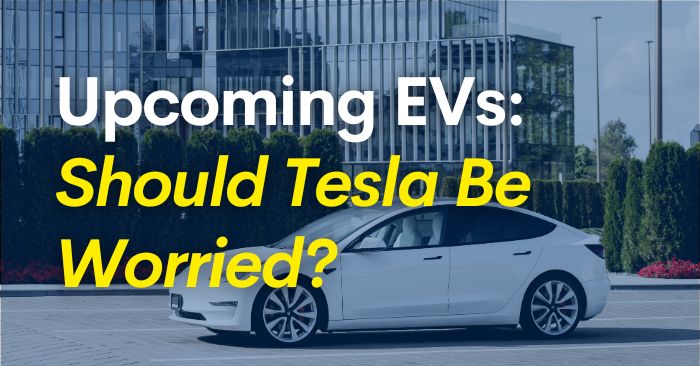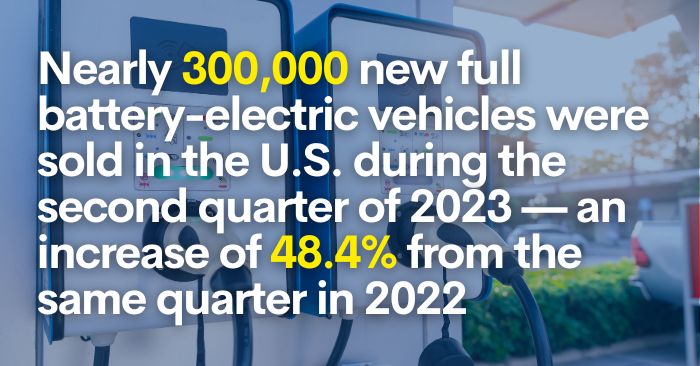The electric vehicle (EV) industry is witnessing a paradigm shift. As the world moves towards sustainable transportation, the EV market has been expanding at an unprecedented rate. Tesla, Inc., a pioneer in the EV sector, has played a significant role in this transformation. However, the landscape is evolving rapidly, with both emerging and established auto brands now vying for a share of the burgeoning market.
This article dives into Tesla’s impact on the EV industry, the rise of new players like Lucid, Polestar, and Rivian, and how traditional automobile manufacturers are making their foray into the EV market. As the competition intensifies, the question arises – should Tesla be worried? Let’s explore:
| Auto Manufacturer | Number of Planned EV Models by 2025 | Investment in EVs (USD Billion) |
| Tesla | N/A (Already fully electric) | N/A |
| Lucid Motors | N/A (Already fully electric) | N/A |
| Polestar | N/A (Already fully electric) | N/A |
| Rivian | N/A (Already fully electric) | N/A |
| General Motors | 30 | 27 |
| Ford | More than 10 | 22 |
| Nissan | 12 | 17.6 |
| BMW | 25 | 32 |
| Volkswagen | More than 70 | 86 |

The Impact of Tesla on the Electric Vehicle Industry
Tesla has revolutionized the electric vehicle (EV) sector, transforming EVs from niche to mainstream through innovative technology and design. Tesla’s unique blend of appealing designs and pioneering EV technology has positioned it as a leader in innovation and environmental stewardship.
Tesla’s success is rooted in its focus on sustainable technology, high-performance vehicles, and customer-centric features like over-the-air updates. This approach has not only propelled Tesla to the forefront of the EV market but also influenced other manufacturers to expedite their own EV programs.

Emerging Electric Vehicle Brands: Lucid, Polestar, and Rivian
Lucid Motors
Lucid Motors, an American electric vehicle manufacturer, was founded in 2007, originally under the name Atieva. The company initially focused on building electric vehicle batteries and powertrains for other vehicle manufacturers. In 2016, Atieva rebranded as Lucid Motors and announced its intent to develop an all-electric, high-performance luxury vehicle.
Lucid’s vehicles are designed in California and assembled in the United States. The company’s flagship vehicle, the Lucid Air, has received acclaim for its segment-leading range estimate, designer interior, and impressive acceleration.
Polestar
Polestar is a Swedish automotive brand owned by Volvo Cars that currently produces electric vehicles. Established in 1996 as Flash Engineering, it was later rebranded as Polestar Racing after being acquired by Volvo Cars in 2015. Polestar’s ownership is split between Volvo Cars and China-based Zhejiang Geely Holding Group.
The Polestar 2 is currently the most popular vehicle sold by Polestar. It has been particularly successful in Germany, where it was the most popular electric company car in 2022, surpassing rivals such as the Tesla Model 3 and Volkswagen ID.4. The most popular variant of the Polestar 2 was the Long-Range Dual Motor, followed by the Single Motor version.
Rivian
Rivian Automotive, Inc., an American manufacturer, was founded in 2009. The company is known for producing electric vehicles, including an SUV and a unique “skateboard” platform that can support future vehicles or be adopted by other companies.
This platform is a modular base that houses the battery pack, drive units, suspension, braking, and thermal system, all on one flat structure. This allows for various bodies to be placed on top, providing the flexibility to produce a range of vehicles from the same core design.
Rivian’s flagship vehicles are the R1T, an all-electric pickup truck, and the R1S, an all-electric SUV. Both vehicles are designed for both on-road comfort and off-road adventures. They offer impressive performance and range, with the R1T offering up to 410 miles of range and the R1S offering up to 400 miles of range.
Emerging brands such as Rivian are pushing the boundaries of electric vehicle technology, offering consumers a range of options that combine sustainability, performance, and design.
But it’s not just about the vehicles themselves. These companies are also investing in the infrastructure and technology needed to support electric vehicles. This includes developing fast-charging networks, improving battery technology, and integrating advanced driver-assistance systems for enhanced safety and convenience.
As the electric vehicle market continues to evolve, these emerging brands are well-positioned to play a significant role in shaping the future of transportation. In other words, Tesla might want to watch out.
Established Automobile Brands and Their Foray into Electric Vehicles
As the demand for electric vehicles continues to grow, several well-known automobile manufacturers have made significant strides in developing and launching new EV models. Here are a few notable examples:
General Motors
General Motors (GM), has made a strategic pivot towards electric vehicles. Recognizing the growing demand for sustainable transportation, GM has committed to introducing 30 new electric models by 2025. This ambitious plan underscores GM’s dedication to leading the charge in the EV revolution and its commitment to reducing carbon emissions.
GM’s electric vehicle lineup is diverse, designed to cater to a wide range of consumer needs. The Chevrolet Bolt EV, one of GM’s flagship electric models, is particularly noteworthy. Lauded for its affordability, the Bolt EV has played a crucial role in making electric vehicles more accessible to a broader consumer base.
Ford
Ford Motor Company has also entered the EV market with its new Mustang Mach-E, an all-electric SUV. The Mustang Mach-E represents a significant departure from the traditional Mustang lineup, known for its high-performance sports cars. The Mach-E maintains the Mustang’s iconic design and performance while offering the benefits of an electric powertrain. Additionally, Ford has also unveiled the F-150 Lightning, an all-electric version of its best-selling pickup.
Nissan
Nissan has quickly become a pioneer in the EV market. The automaker’s Nissan Leaf, introduced in 2010, is one of the world’s best-selling electric cars. The Leaf’s success can be attributed to its affordability, reliability, and practicality, making it a popular choice for consumers. The company is continuing to innovate with new models and technologies. In 2022, Nissan launched the Ariya, an all-electric crossover SUV.
BMW
Among BMW’s electric offerings, the BMW i3 and i8 stand out. The i3, launched in 2013, is a compact electric car known for its innovative design and impressive range. The i8, on the other hand, is a plug-in hybrid sports car that combines the efficiency of an electric motor with the power of a traditional combustion engine.
In addition to these models, BMW has a comprehensive lineup of plug-in hybrid vehicles that combine the versatility of gasoline engines with the efficiency of electric powertrains. These models offer drivers the flexibility to switch between electric and gasoline power, depending on their needs and driving conditions.
Volkswagen
Volkswagen has made a significant push into electric vehicles with its ID series. The ID.4, an all-electric SUV, is a standout model in the ID series. It has been particularly well-received by consumers for its range, performance, and comfort. The ID.4 is designed to be as versatile as it is innovative, offering a spacious interior, advanced safety features, and a range that caters for everyday commuting as well as longer journeys.
In addition to the ID.4, Volkswagen’s ID series includes several other models, each designed to cater to different consumer needs. For instance, the ID.3 is a compact hatchback that combines the practicality of a city car with the benefits of electric driving. Looking ahead, Volkswagen has announced plans for more models in the ID series, including the ID. Buzz, a modern reinterpretation of the iconic Volkswagen Microbus.
These established brands’ foray into electric vehicles signifies a significant shift in the automobile industry. As technology continues to evolve, automakers like GM and Volkswagen are poised to play a substantial role in shaping the future of transportation.
The Imperative of Innovation for Tesla’s Continued Success
In the fast-paced electric vehicle (EV) industry, innovation is paramount. Tesla, a pioneer in this field, must continually innovate to maintain its leadership.
Tesla’s success is built on groundbreaking innovations in battery technology, autonomous driving, and customer experience. However, the EV market is becoming increasingly competitive with the entry of emerging brands like Lucid, Polestar, and Rivian, and established brands like General Motors, Ford, Nissan, BMW, and Volkswagen.
Tesla’s ability to stay ahead hinges on its capacity to push the boundaries of EV technology, including improving vehicle range and performance, enhancing user experience through advancements in autonomous driving and over-the-air updates, and other customer-centric features. In the dynamic world of electric vehicles, innovation is not just the name of the game—it’s the key to winning it.
The Road Ahead
Tesla, with its pioneering innovations, has set the stage for complete transformation of the eletric vehicle industry. The entry of new players like Lucid, Polestar, and Rivian, coupled with the foray of established automobile manufacturers into the EV market, however, have intensified the competition.
While Tesla’s contributions to the EV industry are undeniable, the company faces the challenge of maintaining its leadership position in an increasingly crowded market. The key to Tesla’s continued success lies in its ability to innovate and adapt in response to these emerging trends.
As the EV market continues to grow, consumers stand to benefit from a wider range of options, improved technology, and more competitive pricing. Regardless of which brand comes out on top, the ultimate winner will be sustainable transportation and, by extension, our planet. The future of transportation is electric, and it is unfolding right before our eyes. The question is not whether Tesla should be afraid, but rather how Tesla and other companies will build the future of mobility.




